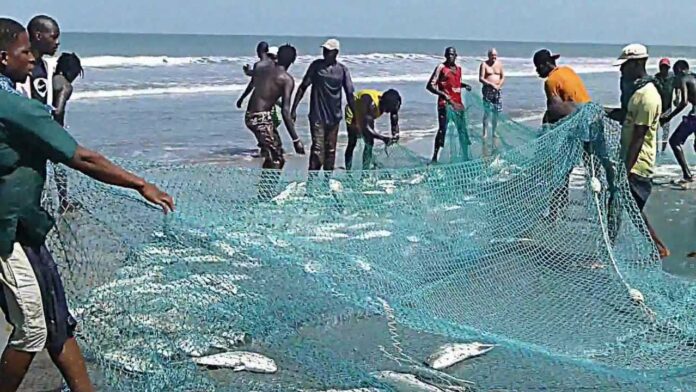By Michaella Faith Wright
The arrival of the rainy season brings both blessings and challenges to the nation’s fishing communities along its coast and rivers. This period, characterized by heavy downpours and turbulent waters, significantly affects the daily lives and economic activities of fishermen who depend on the bounty of the Atlantic Ocean and the Gambia River for their sustenance and livelihoods.
Challenges on the Water
For many fishermen, the rainy season means contending with rougher seas and stronger river currents. These conditions make fishing more hazardous and often limit the days they can safely venture out. “During the rainy season, the waves are higher and more unpredictable,” said Lamin Sanyang, a fisherman from Bakau. “It can be dangerous, and sometimes we have to stay ashore for days, which affects our income.”
Increased water levels and stronger currents also make it more difficult to navigate traditional fishing boats, posing a risk to both fishermen and their equipment. Many fishermen report higher maintenance costs due to damages incurred during this season.
Economic Strain
The reduced fishing days and increased difficulty in catching fish directly translate to lower incomes for fishermen and their families. Many fishing communities in The Gambia rely heavily on daily catches to meet their basic needs. “When the fish are scarce, our earnings drop,” said Fatoumatta Jawara, a fish seller in Bakau Market. “It affects not just the fishermen, but also those of us who depend on buying and selling the fish.”
Additionally, the rainy season often leads to higher prices for fish in the markets due to the decreased supply. This price hike can strain household budgets, especially for low-income families who rely on fish as a primary source of protein.
Voices from the Community
In an interview with Allieu Saine, the president of the fishermen in Bakau, shared insights from his 30 years of experience.
“I have been into fishing for over 30 years, following in the footsteps of my parents. Fishing is our culture and livelihood,” he said.
Saine highlighted several challenges they face during the rainy season, including the destructiveness of the rains themselves, the competition from industrial fishing, and the high cost of petrol.
“Petrol is very expensive now, and it significantly affects our operations,” he added.
Saine also shared some of the successes and community benefits of his career in fishing.
“I have been able to build a house and send three of my children to the University of The Gambia. I can support my community and provide for my family,” he said.
His advice to young people is to work hard and think of their community and families.
Environmental Stewardship
Preserving the ocean is a key focus for these communities. “We clean the ocean, stop throwing waste and oils into the river, and educate others to do the same,” Saine explained. “If people stop polluting, our sea can come back to normal.”
Assan Njie, another seasoned fisherman from Bakau Wharf with over 45 years of experience, echoed similar sentiments. “The water is rougher now, and our nets often get damaged. We face many challenges, but I will not give up despite getting old,” he said. Njie urged the government to do more to support the fishing community.
Looking Ahead
The rainy season highlights the resilience and adaptability of The Gambia’s fishing communities. Despite significant challenges, these communities continue to work hard and support one another. Improved infrastructure, such as better harbours and storage facilities, along with ongoing training on sustainable practices, could help mitigate some of the adverse effects.
As climate change continues to impact weather patterns, understanding and adapting to these seasonal changes will be crucial for the sustainability of The Gambia’s fishing industry. By addressing these challenges head-on, Gambian fishing communities can continue to navigate the storms and secure their livelihoods for future generations.
While the rainy season presents significant challenges to fishing activities and livelihoods in The Gambia, the resilience and adaptability of its fishing communities offer hope. Through collective efforts and continued support, these communities can weather the storms and thrive amidst the changing tides.




